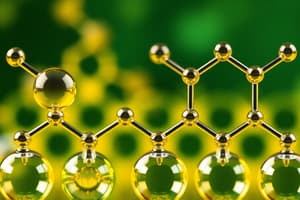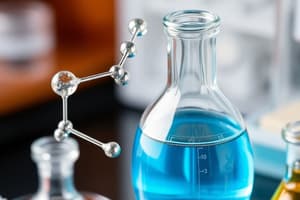Podcast
Questions and Answers
What is the main advantage of preparing silanes by direct reaction instead of by hydrolysis?
What is the main advantage of preparing silanes by direct reaction instead of by hydrolysis?
- It requires fewer reagents and catalysts
- It produces silanes with higher reactivity
- It gives one product rather than a mixture and a quantitative yield (correct)
- It is a safer method with no risk of explosion
What happens when pure silanes react with halogens?
What happens when pure silanes react with halogens?
- They form stable compounds
- They remain unreactive
- They undergo a slow combustion process
- They ignite in air and explode (correct)
In what conditions do silanes readily hydrolyze?
In what conditions do silanes readily hydrolyze?
- In the absence of any catalyst
- In alkaline solutions or with trace alkali leached from glass apparatus (correct)
- In the presence of strong reducing agents
- In the presence of pure water only
What important reaction do compounds with Si-H bonds undergo with alkenes?
What important reaction do compounds with Si-H bonds undergo with alkenes?
How do silanes compare to alkanes in terms of reactivity?
How do silanes compare to alkanes in terms of reactivity?
What is the primary advantage of preparing silanes by direct reaction instead of by hydrolysis?
What is the primary advantage of preparing silanes by direct reaction instead of by hydrolysis?
How do pure silanes react with halogens?
How do pure silanes react with halogens?
In what conditions do silanes readily hydrolyze?
In what conditions do silanes readily hydrolyze?
What important reaction do compounds with Si-H bonds undergo with alkenes?
What important reaction do compounds with Si-H bonds undergo with alkenes?
How do silanes compare to alkanes in terms of reactivity?
How do silanes compare to alkanes in terms of reactivity?
Flashcards are hidden until you start studying
Study Notes
Advantages of Direct Reaction for Silanes
- Direct reaction allows for easier control over conditions, leading to higher purity and yield of silanes.
- Reduced complexity compared to hydrolysis, minimizing by-products and the need for additional purification steps.
Reaction of Pure Silanes with Halogens
- Pure silanes react with halogens to yield silhalides and produce hydrogen halides as by-products.
- These reactions are exothermic and can proceed readily under ambient conditions.
Conditions for Hydrolysis of Silanes
- Silanes hydrolyze readily in the presence of water, especially under acidic or basic conditions that can speed up the reaction.
- Elevated temperatures can also enhance the hydrolysis rate, promoting the formation of silanols.
Reaction of Si-H Bonds with Alkenes
- Compounds containing Si-H bonds undergo hydrosilylation when reacting with alkenes, adding across the double bond.
- This reaction produces silanes that contain larger hydrocarbon chains, facilitating further functionalization.
Reactivity Comparison: Silanes vs. Alkanes
- Silanes exhibit higher reactivity compared to alkanes due to the presence of Si-H bonds, making them more susceptible to electrophilic attack.
- The silicon atom's lower electronegativity allows for easier bond cleavage, enhancing the reactivity of silanes in various chemical reactions.
Studying That Suits You
Use AI to generate personalized quizzes and flashcards to suit your learning preferences.




